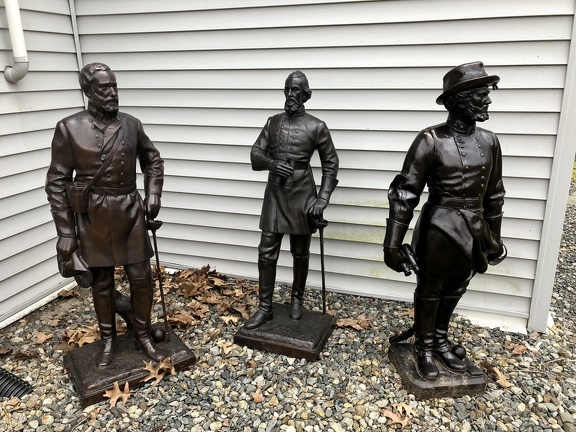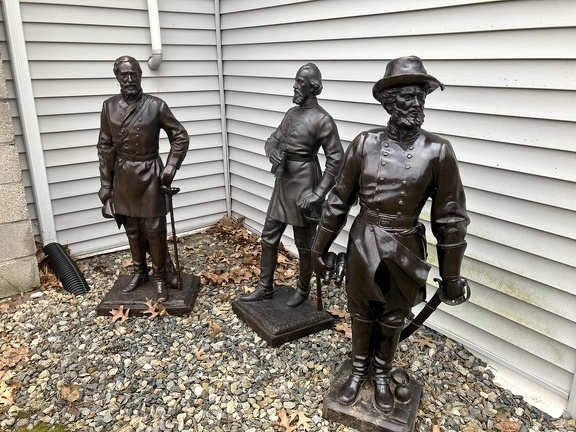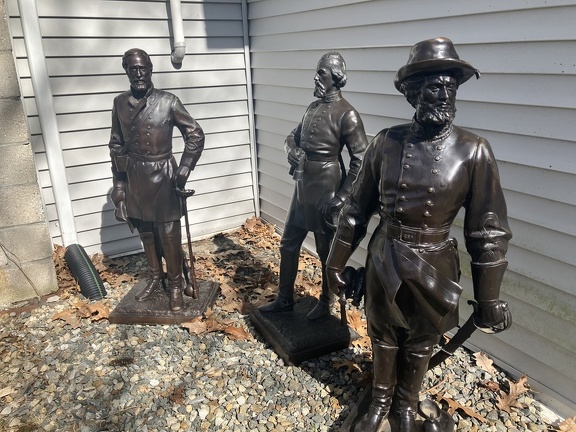During the past week or so, too many things have been going wrong. Too many mistakes, fails, mishaps, fiascos. None of the things are particularly serious in themselves, but combined, they feel like an avalanche, a cascade, a tidal wave of badness.
It started with a UPS fiasco. I bought a retired American Girl doll named Caroline from an Amazon seller, but the UPS driver could not find my house. I received an email prompting me to go to the UPS website to either confirm or correct my address, and I confirmed that I had entered my address correctly. The same exact thing, however, happened again the following day. I emailed UPS to give them directions to my house, but the same thing happened yet again! So I called them (something that is very difficult for me due to my shyness). The driver was finally able to find my house, but not until I had already left for work (I work afternoons / evenings). This would be fine, except for the fact that a signature was required for the delivery. So UPS informed me that they were sending my package to a convenience store that doubles as a UPS access point. I figured, therefore, that I would be able pick up my package up the next day before work, but it didn’t actually get to the convenience store until late afternoon. So I had to wait until the day after that. On that day, as I was about to leave for the convenience store, my mom texted, much earlier than I was anticipating, to let me know that she was ready to meet for lunch before work. So I had to wait another day. Finally, I made it to the convenience store and excitedly told the cashier I was there to pick up a UPS package. She asked for my ID, which, to my dismay, I realized I did not have. (I had brought my credit card, debit card, and subway pass, just in case I might need them, but it didn’t occur to me to bring my license.) Because an ID was required to pick up my package, I returned home empty-handed, having made the 40-minute round trip walk for nothing.
(Wow, that paragraph turned out to be really long!)
The fiascos continued from that point, with the following being a few examples:
- When I went to Starbucks before work, they got my drink wrong, giving me a smaller size than what I had paid for. I brought it back (difficult for me due to my shyness) and they got it wrong again!
- My neighbor called me, texted me, and then began banging on my door all while I was in the middle of a therapy appointment via zoom. I was having tree work done in my yard, and feared that something seriously bad had happened, such as a tree falling on my neighbor’s house and destroying it. I didn’t know whether to continue with the therapy appointment or to tell my therapist that an emergency was happening and that I had to go. I opted for the first option, but was so distracted that I wasn’t able to absorb anything my therapist was saying. It turned out that my neighbor’s issue was not urgent or time-sensitive at all.
- I was asked to work an overnight shift, and my parents and I made plans to have dinner at a nearby restaurant before work, something that I really enjoy but don’t often get to do because I usually work at dinnertime. I packed a bag of the things that I would need for work and put it in the trunk of my mom’s car. Before dinner, I worked out on my parents’ exercise bike (which I use sometimes because I don’t own one myself). We got into my dad’s car, drove to the restaurant, and parked outside it. I opened the trunk and was appalled to find no bag inside. Neither my parents nor I put two and two together to realize that because the car that was used to drive from my house to my parents’ house was a different car than the one used to drive from my parents’ house to the restaurant, I would need to move my bag from one trunk to the other. I ended up in tears and feeling so sick that I was unable to eat anything, and my dad ended up having to drive back to the house to get the bag.
- At work, I was assigned a block of time to collect shopping carts in the parking lot, but I didn’t, because I didn’t know I was supposed to do that during that block of time. (I really enjoy collecting shopping carts too; I just completely forgot that I was supposed to do it.)
- I decided to walk around the pond near my house and take photos of the pretty trees, because the white and pink flowers were beginning to bloom and looked really beautiful. When I reached the beautiful trees, I took my camera out of my purse, turned it on, composed the shot, and pushed the shutter button. Nothing happened. I pressed the shutter again and again, but no matter how hard I tried, my camera was unable to take photos.
- An extremely embarrassing incident happened at work, in which I got one customer confused with another and said something to him that made absolutely no sense, because I thought he was the other customer.
None of these things are the end of the world, exactly, but with so many of them happening within a relatively short amount of time, I am stressed, angry with myself, and filled with self-doubt. My life has been filled recently with one setback after another, and I haven’t been able to fully recover from each setback before the next one happens. I keep getting knocked off-balance, and there is no time to re-stabilize before I am knocked off balance again.
Some of these fiascos are just bad luck (e.g. Starbucks, my neighbor, my camera), while others (not bringing my license, failing to ensure that my bag was in the correct trunk, mixing up my work schedule, mixing up two customers) are arguably my fault.
The fact that I am on the autism spectrum relates to this string of fiascos in two ways: first because my brain is more likely to fail at certain types of tasks, and also because I tend to become more upset than the average person when a relatively minor fiasco happens.
I have a very high IQ, and my brain can do many things that the average person’s can’t. But I also have a disability, namely autism. Although I excel at math, reading comprehension, memorizing facts, and understanding complicated logical concepts, I struggle with things that most people consider to be “common sense.” I tend to forget / misplace / lose track of things; I tend to do badly with social interaction, which includes recognizing and remembering people; I tend in general to fail at things that others find simple.
I also tend to become completely unglued when an unexpected problem occurs.
As I exited the convenience store and walked, dazed, through the parking lot, I was overwhelmed with anger and frustration (at myself, not at the cashier, because the ID requirement logically makes sense). I could feel heat rushing through my body. It felt like the world was spinning around me and I was lost at sea without a paddle, buffeted about by the waves. Even though I knew logically that nothing disastrous had happened – there was nothing time-sensitive within the package, and I could go back and pick it up the following day – I was overwhelmed with emotional upset.
Similarly, the moment I discovered that my camera was inexplicably not working, I was filled with rage so strong that I wanted to kick the nearby wooden bench and smash it to pieces. As I repeatedly turned my camera off and back on again, scrolled through all the different menus trying to figure out what had caused the problem, and tried every possible combination of settings, a lump formed in my throat and tears came to my eyes. Despite knowing logically that I could take pictures with my phone instead, I was overwhelmed with emotional upset by the fact that I was expecting my camera to work the way that it usually does, and it didn’t do that.
The reason these types of things are so upsetting to me is because, as an autistic person, I start each day with a picture in my head of what is going to happen. I expect and need things to go according to this picture. When they fail to do so, my brain basically goes crazy.
In that moment outside the convenience store, all I could think about was that I had planned to pick up my package that day. Not the following day.
In that moment at the pond, all I could think about was that I had planned to walk around the pond and take pictures with my camera. Not with my phone.
I could not access logic in those moments, because I was so overwhelmed by the fact that things did not go according to the picture in my head. Knowing intellectually that the problem wasn’t a big deal didn’t make me feel any better. I couldn’t move on to alternative plans, such as picking up my package the next day or taking pictures with my phone, because my brain was stuck on the picture of how the day was supposed to go.
So over the past weeks I’ve been beating myself up, both about this series of fails and about my reaction to them. I know that I tend to lose track of simple things, so I use compensatory strategies such as setting reminders, using calendars and checklists, and double checking to make sure I haven’t forgotten anything. I know that I struggle with facial recognition, so I make a deliberate effort to remember people’s features, hats, and clothing items. I’ve been beating myself up about the fact that despite being aware of my weaknesses and taking measures to compensate for them, I still failed. And I know intellectually that picking up my package the next day and taking pictures with my phone are perfectly good options, so I’ve been beating myself up for emotionally falling to pieces over what are objectively minor setbacks.
I am generally perceived as being relatively “high-functioning” compared to other people on the spectrum, and other people with disabilities. I live by myself, I work full-time, I don’t go to a day program, and I don’t have a legal guardian or conservator. I take pride in these things and, quite frankly, want it to stay this way. It is important to me to live a life in which I move about freely and make my own decisions, as opposed to being supervised at all times and having my schedule and activities organized by someone else. I don’t want to be a burden, or a pain in the butt, to the people around me. I don’t want to be erupting in emotional outbursts, ruining dinner plans, requiring people to rescue me from crises, or disrupting people’s days with my needs. I want to be a competent person, both at my job and at the tasks that need to be done outside of work. I want to be a person who is calm, logical, and put-together. I want to be able to complete my activities of daily living independently. I don’t want to be dependent on others.
Weeks like this make me doubt myself – my own competence, my own capabilities, and my own ability to function in the world. Recently my new statues have arrived, something that I know intellectually is far more important than any of the fiascos that I’ve described. These past weeks should have been filled with joy and excitement, but instead they’ve been filled with emotional turmoil. Hopefully I will have a relatively fiasco-free stretch of days, and what I know intellectually to be true will also feel true emotionally.





